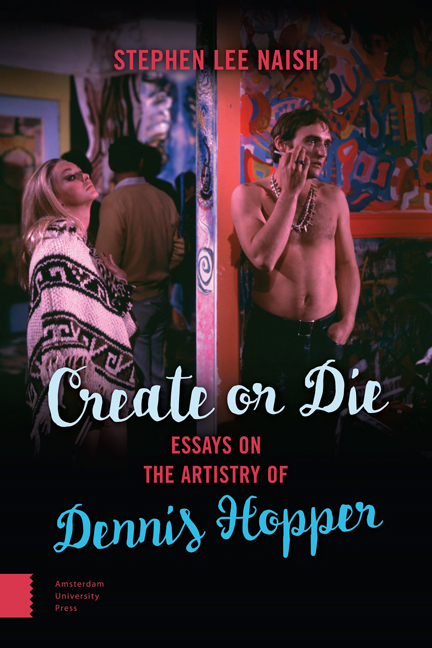Book contents
- Fronmatter
- Dedication
- Contents
- Introduction
- Scenes from a Revolutionary Life: How Dennis Hopper Conquered the American Century
- Hip-Hopp: Dennis Hopper and Music
- The Elephant in the Room: Dennis Hopper and American Politics
- Love and Hate: The Conflict of Emotions in The Blackout and Carried Away
- Commercial Breakdown: Dennis Hopper in the World of Advertisements
- White Light/White Heat: Actor and Character Collide in White Star
- Double Standards: The Art and Photography of Dennis Hopper
- Coda: The Fourth Wall
- Acknowledgements
- Notes
- Bibliography
Scenes from a Revolutionary Life: How Dennis Hopper Conquered the American Century
Published online by Cambridge University Press: 11 December 2020
- Fronmatter
- Dedication
- Contents
- Introduction
- Scenes from a Revolutionary Life: How Dennis Hopper Conquered the American Century
- Hip-Hopp: Dennis Hopper and Music
- The Elephant in the Room: Dennis Hopper and American Politics
- Love and Hate: The Conflict of Emotions in The Blackout and Carried Away
- Commercial Breakdown: Dennis Hopper in the World of Advertisements
- White Light/White Heat: Actor and Character Collide in White Star
- Double Standards: The Art and Photography of Dennis Hopper
- Coda: The Fourth Wall
- Acknowledgements
- Notes
- Bibliography
Summary
In a 1971 interview with chat show host Merv Griffin, Dennis Hopper, then promoting his second directorial film The Last Movie, stated that he saw himself as a social critic and that his films Easy Rider and The Last Movie commented directly on America's social ills. With the critical backlash of The Last Movie, Hopper had become a staunch defender of his own work but also realised his vision was way ahead of the majority of mainstream American film audiences. Towards the end of the interview, Hopper comments that The Last Movie is essentially ”…a social protest film, and I’m going to go on being a social critic.” He goes on to add, “but I’m going to have to simplify and romanticize my work so I can identify with an audience”. Dennis Hopper ingrained himself within the very fabric of American popular culture. His continuous social commentary drew into his movies subtle elements of pop culture, music, politics, and his own reality that represented the themes of the era. Consciously or unconsciously, his films and art have acted as reflections of the times in which they were made. In order to understand Hopper's cultural value, we must first take into account his importance in film, the aspect of his career that he is most widely recognised for. What follows below is a chronological exploration and summary of Hopper's film performances that also takes into account his directorial work. I have also summarised the political and social landscapes in which these films were made, in order to better comprehend Hopper's effect on the American psyche. Although some films have been left out from the study for various reasons (1993's Mario Bros springs to mind), I have endeavoured to include the films that are significant to Hopper's artistic evolution, the critically acclaimed performances, and those films that have been popular with audiences, either based on commercial success, critical praise, or cult status.
The Matinee Idol and the Method
America enjoyed a glorious renaissance in the post-war boom of the 1950s. After the economic slump of the 1930s, the horrors of the Second World War, and the grim attrition of the Korean War, America was ready to begin again. The inauguration of President Eisenhower in 1953 brought with it a “new optimism and unprecedented prosperity” to American society.
- Type
- Chapter
- Information
- Create or DieEssays on the Artistry of Dennis Hopper, pp. 15 - 40Publisher: Amsterdam University PressPrint publication year: 2016



